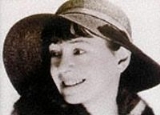
poet
, short story writer, critic and satirist
, best known for her wit
, wisecracks, and eye for 20th century urban foibles.
From a conflicted and unhappy childhood, Parker rose to acclaim, both for her literary output in such venues as The New Yorker
and as a founding member of the Algonquin Round Table
. Following the breakup of the circle, Parker traveled to Hollywood to pursue screenwriting
. Her successes there, including two Academy Award nominations, were curtailed as her involvement in left-wing politics
led to a place on the Hollywood blacklist
.
Parker went through three marriages (two to the same man) and survived several suicide attempts but grew increasingly dependent on alcohol.
Excuse my dust.![]()
And she had It. It, hell; she had Those.![]()
Salary is no object: I want only enough to keep body and soul apart.![]()
It is that word 'hummy,' my darlings, that marks the first place in The House at Pooh Corner at which Tonstant Weader fwowed up.![]()
That would be a good thing for them to cut on my tombstone: Wherever she went, including here, it was against her better judgment.![]()
The House Beautiful is, for me, the play lousy.![]()
[A] lady ... with all the poise of the Sphinx though but little of her mystery.![]()
Drink and dance and laugh and lie,Love, the reeling midnight through,For tomorrow we shall die!(But, alas, we never do.)![]()
[On the most beautiful words in the English language] The ones I like...are "cheque" and "enclosed."![]()

